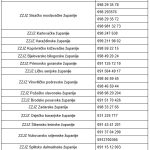As Poslovni Dnevnik writes on the 11th of May, 2020, countries like Croatia and Greece, which introduced early measures to prevent the spread of the coronavirus epidemic, have experienced greater citizen cooperation, which is linked to the experiences of wars and financial crises, according to The New York Times.
During the coronavirus pandemic, a paradox was observed in the world: Rich countries didn’t prove to be any better at fighting the crisis than poorer ones.
Wealthy countries, which have traditionally been able to allocate resources quickly, strengthened by well-funded government mechanisms designed to better overcome crises, have generally not managed the coronavirus pandemic well at all.
In Europe, the disease has ravaged Britain, France and Italy, three of the four largest economies on the European continent. But smaller, poorer countries in Europe have quickly imposed and applied the strict restrictions they have adhered to and have so far had more success in curbing the spread of the new virus.
Among these countries, some of which are now cautiously re-opening their economies and societies, are those with strong reserves of resilience as a result of experiences from relatively recent difficult times. Given what their residents went through not so long ago, these coronavirus-induced measures seemed less strenuous and prompted far greater social cooperation.
As an example of these countries, the New York Times points out countries such as Greece and Croatia, in which the authorities have a positive view of the resilience of their population, reports N1.
In Croatia, many still remember being indoors listening to the sound of sirens during the Homeland War. In Greece, where restrictions imposed during the tragic debt crisis are still fresh in the memory of the population, the possibility of one in three people losing their job is nothing all that new.
They cite the experience of Iza Morovic, a 45-year-old barber from Zadar, who, after being isolated in his house with his wife and two young daughters, recalled the war in the early 1990s, when he ran up to a nearby hill to sound an air raid siren.
“I was a kid, I remember playing football and seeing them falling from the sky,” he said. He believes that the disciplined and calm way in which Croats responded to the coronavirus pandemic was a consequence of the recent memories of war and the harsh legacy of communism.
Analysing different responses to the pandemic, Oxford University scientists have developed a scale of stringency, seeking to assess the strength of measures taken by various governments to stop the spread of the new coronavirus, COVID-19.
Here in Croatia, whose ratings are at the very top of the scale that measures the severity of the anti-epidemic measures, 90 people have so far died from coronavirus, bringing the country’s death rate to 2.1 per 100,000 inhabitants. In New York State, that number is 137 per 100,000.
Overall, the severity of the measures is higher in Eastern Europe than it is in Western Europe, said Thomas Hale, an associate professor of public policy at Oxford University who is also the project leader. Many of these European countries are run by centre-right governments.
“Croatia has reached the maximum on our scale of stringency,” Hale said. Reiterating Iza Morovic’s thoughts on discipline, he added: “It’s possible that people are less willing to resist and more willing to accept tougher measures.”
This way of managing the crisis has enabled Croatia to be one of the first, back on April the 27th, to cautiously ease some restrictions. Greece lifted its restructions on May the 4th, and other countries in the area, such as the Czech Republic and Croatia’s neighbour to the north, Slovenia, are gradually returning to a sense of normalcy.
The word that is sometimes applied to societies in these parts of Europe is “resilience”.
Professor Frosso Motti-Stefanidi, who teaches at the University of Athens, is a global authority in interpreting this type of resilience. He says this trait is best defined as “a person or society that functions well despite experiencing acute stress or long-term adversity”.
But in the context of the ongoing coronavirus pandemic, she said, resilience alone doesn’t explain why some countries are better able to deal with the crisis than others: Positive outcomes rely on citizens who believe the measures the government is taking are appropriate, leading to trust and respect.
For more on coronavirus in relation to Croatia, follow our dedicated section.










